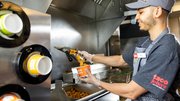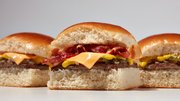Blog
McDonald's Cyclospora issues highlight field-to-plate food handling challenges
Two facts stand out from the cases of cyclospora infection being traced so far to some McDonald's salads and Del Monte vegetable trays: The parasite hangs out in human feces and once it's on food it is nearly impossible to wash it away, according to health officials.

July 18, 2018 by Betsy Craig — pres, menutrinfo.com
In his decades of litigating food safety cases, food safety lawyer Bill Marler came up with a list of six food items he never eats outside the home. Number 4 on that list just happens to be pre-cut fruits and vegetables along the lines of those served at any restaurant, including the one at the heart of the Cyclospora cases, McDonald's. Here's why Marler said he put pre-cut produce on his list:
"I avoid these like the plague. Why? The more a food is handled and processed, the more likely it is to become tainted," he said on his law firm's website, Food Poison Journal.
"We've gotten so used to the convenience of mass-produced food — bagged salad and boxed salads and pre-cut this and pre-cut that. Convenience is great but sometimes I think it isn't worth the risk."
With the recent cyclospora cases — which health agencies have said appears to have been acquired when victims at McDonald's salads — food safety geeks like myself have been hugely concerned because the reality is, this could happen to any brand because food is handled so much en route from farm to table. So even mega-brands, like McDonald's —which have gotten their ordering and supplier protocol down to a science — can suffer problems, along with their sickened customers. As a result, despite everything the brand does in-house to prevent problems like those unfolding this month, bugs still get into the food supply somewhere along the chain from farm field to customer order.
The bug at the root of McDonald's current problems
Cyclospora is an intestinal illness caused by a parasite, according to the U.S. Centers for Disease Control and Prevention. It affects foods tainted with infected human feces. It cannot necessarily be washed away, according to federal health authorities once food is tainted with it.
But restaurants can still put their best foot forward every time with every guest with proper plans of action. And that always goes back to each brand's standard operating procedures, including food safety and handling policy, procedure and training.
According to the CDC, the case count involved in the McDonald's salad greens cyclospora incidents now includes victims in seven Midwestern states. Fresh vegetable trays from Del Monte sold in neighboring states are also under investigation.
Those two companies are at Ground Zero, but the ripple effect from these kinds of outbreaks is inevitable. Adding complication to the investigation and even prevention strategies also is the fact that not all the states involved have the same requirements for food safety training at restaurants under their jurisdiction. That has created an uneven regulatory map from state to state, adding precious time and other challenges to ultimately finding the initial source of the problems.
The point behind the parasite
But the bottom line is that while food safety and handling policies and procedures are vital to any QSRs efforts to prevent such problems, ultimately those don't matter if you haven't trained your team around them. Training is the link that makes your overall program for food safety prevention really work by giving all the tangents maximum punch.
Initial and ongoing employee training around the importance of handwashing, as well as safe handling and serving procedures, is critical in this business today, both on a mission and marketing level, as well as a legal basis. Basic food safety policies and procedures should include the management of raw products from delivery to service, including washing, preparation and storage.
Additionally to really be effective — particularly in cases like this where the pest cannot be removed through washing — training must reach all the way to the field where the foods are grown to help ensure safety for the customer and brand confidence in the products. That requires diligence right down the line from brand, to distributor and supplier, to grower and field worker.
QSR's can also use barcoding technology to obtain accurate inventory information and easily trace recalls. The end goal is to establish efficiency, traceability and a universal language for product information, all in the name of food safety.
When we look back at cases like the listeria outbreak that caused 33 deaths from tainted cantaloupe in 2011, the farm ended up being at the root of the problem, as reported by the Denver Post. The problems behind the Cyclospora issues at McDonald's are still under investigation as health departments and federal health authorities work furiously to develop a trustworthy conclusion. But discovering how and when the food became tainted is key to breaking free of the problem and recovering from its damages. That process is difficult to say the least.
But it's clear that wherever a food safety problem begins, it usually ends with the restaurant itself. As a result, QSR brands have a responsibility to have and enforce food safety standards by taking all the proper precautions, including training employees, as well as fully assisting local and state health officials in their investigations and being as proactive as possible to ensure future safety.
Photo: iStock
About Betsy Craig
To date MenuTrinfo is responsible for menu nutritional information at over 100K US restaurants, food allergy and gluten free ANAB accredited training for hundreds of thousands of food service professionals. AllerTrain is the chosen food allergy training by NEHA providing continuing educational credit hours for those that take and pass its course. Finally, MenuTrinfo delivers food allergy confidence and allergen transparency to today’s food allergic consumer through its onsite division offerings, AllerCheck, Certified Free From allergens for spaces and food products which is an ISO 17065 certification and expert consultation and incident response support when needed.
 ChatGPT
ChatGPT Grok
Grok Perplexity
Perplexity Claude
Claude








